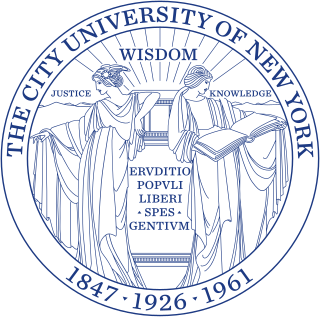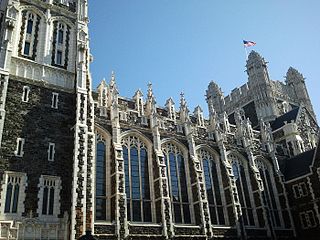Related Research Articles

The City University of New York is the public university system of New York City. It is the largest urban university system in the United States, comprising 25 campuses: eleven senior colleges, seven community colleges and seven professional institutions. While its constituent colleges date back as far as 1847, CUNY was established in 1961. The university enrolls more than 275,000 students, and counts thirteen Nobel Prize winners and twenty-four MacArthur Fellows among its alumni.

The State University of New York is a system of public colleges and universities in New York State. It is the largest comprehensive system of universities, colleges, and community colleges in the United States, with a total enrollment of 424,051 students, plus 2,195,082 adult education students, spanning 64 campuses across the state. Led by interim chancellor Deborah F. Stanley, the SUNY system has 91,182 employees, including 32,496 faculty members, and some 7,660 degree and certificate programs overall and a $13.08 billion budget.

Queens College (QC) is a public college in the Queens borough of New York City. It is part of the City University of New York system. Its 80-acre campus is primarily located in Flushing, Queens. It has a student body representing more than 170 countries.

The Graduate School and University Center of the City University of New York is a public research institution and post-graduate university in New York City. Serving as the principal doctorate-granting institution of the City University of New York (CUNY) system, The Graduate Center is classified among "R1: Doctoral Universities – Very High Research Activity". The school is situated in the landmark B. Altman and Company Building at 365 Fifth Avenue in Midtown Manhattan, opposite the Empire State Building. The Graduate Center has 4,600 students, 31 doctoral programs, 14 master's programs, and 30 research centers and institutes. A core faculty of approximately 140 is supplemented by over 1,800 additional faculty members drawn from throughout CUNY's eleven senior colleges and New York City's cultural and scientific institutions.

The State University of New York College at Buffalo is a public college in Buffalo, New York. It is part of the State University of New York (SUNY) system. Buffalo State College was founded in 1871 as the Buffalo Normal School to train teachers. It offers 79 undergraduate majors with 11 honors options, 11 post baccalaureate teacher certification programs, and 64 graduate programs.

Lehman College is a public college in the Bronx borough of New York City. Founded in 1931 as the Bronx campus of Hunter College, the school became an independent college within CUNY in September 1967. The college is named after Herbert H. Lehman, a former New York governor, United States senator, philanthropist, and the son of Lehman Brothers co-founder Mayer Lehman. It is a senior college of the City University of New York (CUNY) with more than 90 undergraduate and graduate degree programs and specializations.

York College is a public senior college in Jamaica, Queens, New York City. It is a senior college in the City University of New York (CUNY) system. Founded in 1966, York was the first senior college founded under the newly formed CUNY system, which united several previously independent public colleges into a single public university system in 1961. The college is a member-school of Thurgood Marshall College Fund. The college enrolls more than 8,000 students. 35% of undergraduate students graduate within six years.

The California Community Colleges is "a postsecondary education system" in the U.S. state of California. Despite its plural name, the system is consistently referred to in California law as a singular entity. The system includes the Board of Governors of the California Community Colleges and 73 community college districts. The districts currently operate 115 accredited colleges. The online college Calbright College is not accredited. The California Community Colleges is the largest system of higher education in the United States, and third largest system of higher education in the world, serving more than 2.1 million students.
San Diego City College is a public community college in San Diego, California. It is part of the San Diego Community College District and the California Community College System. San Diego City College is accredited by the Western Association of Schools and Colleges (WASC), Accrediting Commission for Community and Junior Colleges (ACCJC).
A chancellor is a leader of a college or university, usually either the executive or ceremonial head of the university or of a university campus within a university system.
An academic senate is a governing body in some universities and colleges, and is typically the supreme academic authority for the institution.

The University of Abuja is a tertiary institution in the Nigerian capital, Abuja. It was established in January 1988 as a dual-mode university with the mandate to run conventional and distance learning programmes. Academic work began in the University in 1990 with the matriculation of its pioneer students.
A university council may be the executive body of a university's governance system, an advisory body to the university president, or something in between in authority.

The Balochistan University of Information Technology, Engineering, and Management Sciences (BUITEMS) is a public research university in Quetta, Balochistan, Pakistan. The Government of Balochistan chartered the university on 18 July 2002. The university officially commenced its academic activities in October, 14th 2002 with three undergraduate programs in Computer Science, Computer Engineering and Business Administration with an initial enrollment of 90 students. The university is structured around four campuses that focus on Engineering, Information Technology Business, Arts, and Life Sciences consisting of 30 academic programs at undergraduate and graduate levels. As of spring 2017, the university has grown to a student strength of 9197, and a faculty of 600.
The City University of New York School of Law is a public law school founded in 1983 as part of the City University of New York. CUNY School of Law was established as a public interest law school with a curriculum focused on integrating clinical teaching methods within traditional legal studies.

Lisa Staiano-Coico, or Lisa S. Coico is an American politician and academic. Coico was the twelfth president of City College of New York, from August 2010 until October 2016.

Colin Powell School for Civic and Global Leadership at the City College of New York (CCNY) is a nonpartisan educational, training, and research center named for its founder, General Colin L. Powell, USA (Retired), a graduate of CCNY. The goals of the Powell School are to build leaders for the common good, promote civic engagement, and strengthen connections between the campus and neighboring communities.

Félix V. Matos Rodríguez is a Puerto Rican academic administrator, currently the eighth Chancellor of The City University of New York (CUNY), the largest urban public university system in the United States. A historian, professor, author and noted Puerto Rican scholar, Matos Rodríguez previously served as president of two CUNY colleges and as a cabinet secretary of the Puerto Rico Department of Family Affairs. He assumed the post of Chancellor of CUNY on May 1, 2019, becoming the first Hispanic to lead the university.

The Student Assembly of the State University of New York (SUNYSA) is the university-wide student government for the 64 institutions of the State University of New York (SUNY). It is empowered by Article XVII of the policies of the SUNY Board of Trustees to represent student concerns, elect the student member of the Board, and to act as a communications network between campus student leaders.
James J. Malatras is an American government official and university administrator who was the Chancellor of the State University of New York (SUNY) system between August 2020 and January 2022.
